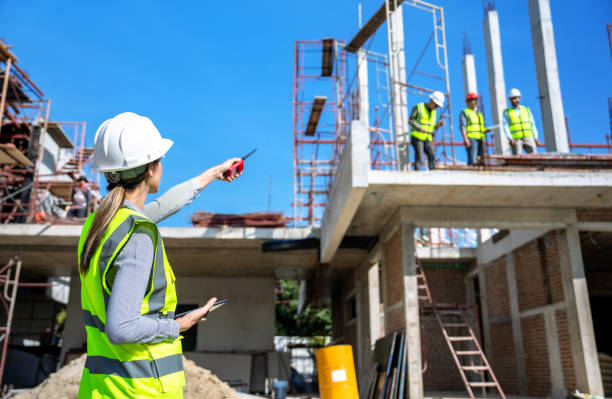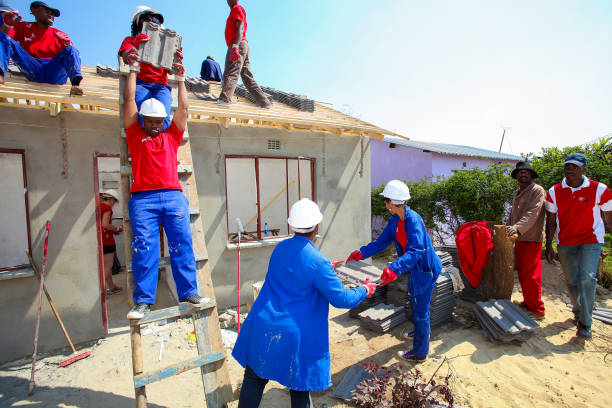Details
Job Title: Construction helper
Employer: Greenways Spray Foam Ltd.
Location: 17079 80 AveSurrey, British Columbia V4N 6J5
Shift: Day, Weekend, Overtime, Early Morning, Morning
Salary: $23.00 to $25.00 hourly (To be negotiated) / 40 hours per week
Terms of employment: Permanent employment, Full-time
Start date: Starts as soon as possible
Vacancy: 4 vacancies
Overview
Languages: English
Education: No degree, certificate, or diploma
Experience: Will train
Tasks
- Load, unload, and transport construction materials.
- Erect and dismantle concrete forms, scaffolding, ramps, catwalks, shoring, and barricades.
- Mix, pour, and spread materials such as concrete and asphalt.
- Clean and pile salvaged materials.
- Tend or feed machines or equipment used in construction.
Who can apply for this job?
The employer accepts applications from:
- Canadian citizens and permanent or temporary residents of Canada.
- Other candidates with or without a valid Canadian work permit.
How to Apply
Online through the company email: [email protected]
By mail: 17079 80 AveSurrey, BCV4N 6J5
Greenways Spray Foam Ltd. is an Equal Employment Opportunity/Affirmative Action employer dedicated to creating an inclusive and diverse workplace. All qualified candidates will be considered for employment without regard to race, color, religion, sex, sexual orientation, gender identity, national origin, protected veteran status, or any other factor prohibited by law or contract.

How to Become a Construction Worker in Canada
Earn a High School Diploma or GED
A high school degree or equivalent can help you get into this field, while it’s not usually a prerequisite. Your diploma may help you progress in your profession by giving you the necessary knowledge for the position.
Math is often helpful in high school since it can aid with construction-related tasks like measuring and combining different components in different proportions according to directions.
Learn About the Construction Industry
It usually helps to understand as much as possible about the tasks you may undertake before seeking construction jobs. Attending a trade school that teaches you about relevant ideas, like how to handle construction tools and how to understand blueprints and building codes, is an efficient method to learn.
As your career develops, trade schools can also help you by assisting you in selecting a particular construction-related specialization.
Work on Your Physical Fitness
Any construction job you choose to pursue will probably require physical labor. Maintaining good physical health can help you work more efficiently and lower your risk of hurting yourself and others.
You must increase your strength and endurance because you’ll be lifting large items and working physically for extended periods.
Earn Entry-level Experience
You can begin your career as a construction worker by applying for temporary, unskilled jobs. Unskilled workers are needed on construction sites to carry out various low-level duties, including trench digging, equipment carrying, debris cleanup, and scaffolding installation.
Usually, you can locate this work by contacting construction sites or working with a temporary staffing company.
Consider Choosing a Specialization
Once you’ve held entry-level construction jobs, you can use your knowledge and experience to choose a particular career path in the construction industry. Pursuing an appropriate certification is a dependable method of learning more about the specialization you have selected.
Some construction worker career paths you can pursue are as follows:
- Carpentry: Construction workers specialize in carpentry by creating and repairing building frameworks, such as door frames and rafters.
- Plumbing: Many construction sites require specialized plumbers to install various pipe systems for water circulation and heating.
- Glazing: Glaziers install glass structures while following specific instructions and blueprints.
Create a Resume
It helps to create a resume that shows your relevant experience and talents before applying to more refined construction positions. Include your relevant soft talents with the hard skills you’ve learned from training and experience that enable you to do construction-related jobs.
These are the kinds of personality qualities that support you in carrying out your duties and working with others. They consist of cooperation, problem-solving, and communication.
Apply to Relevant Positions
Once your resume has been written, begin applying for jobs in construction. They can be found online, through networking groups, specialist employment websites, or by going to construction sites and inquiring about job openings.
It typically helps to review the job description and modify your resume to meet the employer’s needs before submitting it. To increase your chances of getting hired, emphasize any experiences and talents you have mentioned in the job description on your resume.
Requirements of Visa Sponsorship Jobs in Canada
- Passport or travel document.
- Evaluation report of educational qualifications.
- Linguistic examination report.
- Valid job offer from a Canadian employer.
- Provincial nomination.
- Police authorization.
- Medical evaluation.
- Proof of funds.
- Accumulation of expertise, if your sponsor requires experience, employment verification, or a letter, is required.
- Relevant credentials, including diplomas and certifications, are advantageous for semiskilled occupations, including chefs, bakers, and plumbers, though not mandatory.
- It is also important to mention that the LMIA certificate is sponsored by the employer.
Practical Skills for Construction Workers
Proficiency with Specific Tools and Machinery
Whichever expertise you decide on, you’ll probably need specialized tools and equipment. Your competence and efficiency can rise if you become proficient with these things.
Using instruments like drills, saws, screwdrivers, and hammers can also help you complete your job and get expertise in the construction industry. A successful career in this profession usually requires proficiency with various equipment.
Safety Protocols
It is possible for working on a construction site to be dangerous. Therefore, it’s essential to understand and abide by the safety procedures for every item and substance you use because doing so will protect you and your coworkers.
Construction site managers value principled and diligent workers; thus, obtaining a certification in construction safety standards can increase your chances of landing a job.
Math
Because they frequently collect different measures while working, construction workers benefit from having a basic understanding of mathematics. Depending on your area of expertise, you might compute angles, combine particular amounts of materials, and find the total weight of various materials.
You can also compute other numbers that call for mathematical understanding. You can avoid mistakes and adhere to construction specifications with these computations.
Communication
Communication abilities, both written and spoken, are advantageous. Many people working together on projects also communicate well in the construction industry.
Gaining the ability to listen might facilitate understanding of others’ intentions. Acquiring these abilities can facilitate productive collaboration with your peers.
You can also read and comprehend client specifications, equipment instructions, blueprints, and other relevant papers with written communication skills.
Technology
Advanced technical tools are probably used on modern construction sites. These tools are frequently sophisticated technology that assists with particular building activities or specialized software that aids in project planning and monitoring.
Acquiring proficiency in this technology helps enhance productivity and open up new career prospects.
Strength and Stamina
Digging, lifting heavy objects, using big tools, wearing heavy and restrictive safety equipment, and climbing ladders are usual tasks at most construction sites. Since they all require physical strength, building endurance, and fitness are essential for construction workers.
They may also perform their duties by standing or maintaining uncomfortable positions for long periods, sometimes in challenging weather conditions. This additional factor relies on advanced stamina and determination.
Dexterity
Operating construction tools when performing tasks such as cutting, drilling, or sawing may require advanced talent. Besides helping you perform the tasks successfully, this skill can help you maintain a safe environment for yourself and others.
You can improve your mastery by working on your focus and hand-eye coordination.
Salary of Construction Helpers in Canada
According to Talent.com, construction helpers in Canada earn an average salary of $40,950 per year or $21 per hour. Entry-level positions start at $35,342 annually, while most experienced workers make up to $51,617 annually.
Your salary may be affected by location, employer, and the work you can find each year. Some construction helpers belong to a union.
This means that your wage rates and benefits are negotiated by the union representatives on your behalf. Unionized workers may also access benefits, including life and health insurance and paid sick leave.
Frequently Asked Questions
Are construction workers in demand in Canada?
Undoubtedly, construction workers and experts are in great demand across Canada. The country is constantly expanding, and the need for construction workers will continue to be in high demand all year round.
What are the top benefits of working in Canada as a construction worker?
Benefits for construction workers in Canada include:
- Paid vacation
- Sick leaves
- Health insurance, such as medical and or dental plan
- Pension plan
- The opportunity to bring your family with you
